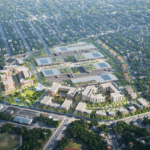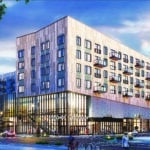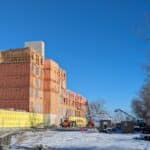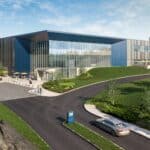
Housing Takes Center Stage in Brockton Developments
In the current development climate, multifamily housing takes top billing in major projects in various stages of planning across Massachusetts, including in the Gateway City of Brockton.

In the current development climate, multifamily housing takes top billing in major projects in various stages of planning across Massachusetts, including in the Gateway City of Brockton.

A two-year permit extension in recent state legislation throws multifamily developers a lifeline – but no silver bullet to overcome still-high obstacles to housing projects breaking ground.

Is 2025 the year of the Boston office comeback? Amid return-to-work mandates and a slight dip in office vacancy rates, there’s optimism in the air.

Tens of millions square feet of office space across America is undergoing conversion to apartments. So why is Boston seeing so little conversion activity?

Massachusetts lost biomanufacturing jobs last year, raising questions about the sector’s future in the state. But local and state leaders are planning initiatives to show the Bay State remains a formidable powerhouse.

A potential solution to Boston’s green energy transformation offering major cost savings is flowing through its sewers, sustainability experts say. So why aren’t more developers diving in?

While city officials must still shepherd their 600-unit development vision near Attleboro’s commuter rail station to fruition, a wave of new housing projects in recent years is fueling multifamily momentum.

Boston’s luxury multifamily market is showing signs of a slowdown, and it is unlikely things like luxe amenities will move the needle in generating more sales.

The biggest dining debate in Boston’s North End is over the state of outdoor dining – something that’s having a much more upbeat rollout elsewhere in Massachusetts this season.

The viability of widescale office-to-residential conversion projects still is up for debate, but signs point to a greater awakening to incorporate multifamily housing into underutilized retail centers across Greater Boston.

Construction costs are already sky-high in Greater Boston, and there is fear decarbonization regulations can add even more strain on affordable housing developers’ wallets.

Time is money in design and development. Is artificial intelligence the wonder drug for commercial projects in a costly market like Massachusetts?

Developers have also found an increasingly receptive audience with city leadership in Gateway Cities just outside Boston at a time when many point to an increasingly high cost of doing business within city limits.

A vital ingredient in generating more housing across Massachusetts is moving forward in several municipalities ahead of an end-of-year deadline. But that doesn’t mean there’s suddenly a silver bullet for housing creation, developers say.

Construction cranes everywhere. Big tenants’ space backfilled when they move to a new tower. If you didn’t know better, Boston’s office market might seem like it’s humming along in a strong economy.

The lab and life science market in Greater Boston and across the nation might be cooling off, but there are still some tailwinds benefiting suburban office-to-lab conversions that were set in motion in recent years.

Experts say Greater Boston’s huge volumes of lab space under construction could give international biotechs without a local presence an opportunity to plant their flag.

Is another sustainability regulation coming down the line for Boston developers? Traditional commercial building materials such as steel and concrete are drawing scrutiny from regulators as a potential contributor to the building sector’s carbon footprint.

Biomanufacturing was supposed to be a big part of the next “Massachusetts Miracle,” but tenant requirements have been cut in half in the last year. But its believers have faith in the sector’s durability over the long term.

From the Seaport to the Back Bay, it might seem like every new condo building going up in Boston has a condo component attached to a well-known luxury brand. And new data shows it’s happening for good reasons.